

Synchronous vs Asynchronous Learning. Synchronous vs asynchronous learning refers to different types of online courses and degree programs.
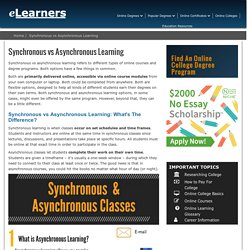
Both options have a few things in common. Both are primarily delivered online, accessible via online course modules from your own computer or laptop. Both could be completed from anywhere. Both are flexible options, designed to help all kinds of different students earn their degrees on their own terms. Both synchronous and asynchronous learning options, in some cases, might even be offered by the same program.
Synchronous vs Asynchronous Learning: What's The Difference? Synchronous learning is when classes occur on set schedules and time frames. Asynchronous classes let students complete their work on their own time. Why Should I Choose Synchronous vs Asynchronous Learning? Whether you ultimately decide to attend a synchronous vs asynchronous program, or one that offers both, you’re sure to find some distinct perks to each. For others, asynchronous learning could be a better fit. MYP and DP language acquisition alignment - αℓιѕση уαηg.
New DP Language Acquisition Guide has been implemented since September 2018 for the first assessment in 2020.
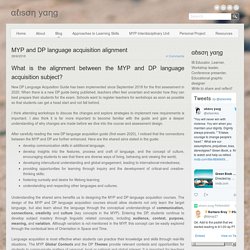
When there is a new DP guide being published, teachers often feel uncertain and wonder how they can best prepare their students for the exam. Schools want to register teachers for workshops as soon as possible so that students can get a head start and not fall behind. I think attending workshops to discuss the changes and explore strategies to implement new requirements is important. I also think it is far more important to become familiar with the guide and gain a deeper understanding of why changes are made before we dive into the course and assessment design. After carefully reading the new DP language acquisition guide (first exam 2020), I noticed that the connections between the MYP and DP are further enhanced.
ATLs in the IBDP. IBMYP Approaches to Learning (AtL) Continuum Documnet May 2013. Skills in Approaches to Learning (ATL) Approaches to Learning. ATLs (Approaches to Learning) ATL skills. Minds-on ATL. "The more you know, the more you realize how little you know.
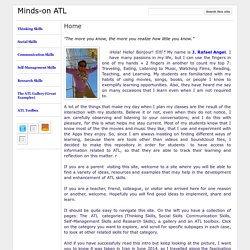
" ¡Hola! Hello! Bonjour! 你好! My name is J. A lot of the things that make my day when I plan my classes are the result of the interaction with my students. If you are a parent visiting this site, welcome to a site where you will be able to find a variety of ideas, resources and examples that may help in the development and enhancement of ATL skills. If you are a teacher, friend, colleague, or visitor who arrived here for one reason or another, welcome. It should be quite easy to navigate this site. And if you have successfully read this intro but keep looking at the picture, I want you to know it was taken in Iran in June 2014, as I travelled along the fascinating lands of the Persian Empire.
Make the most of this site! ATL - Approaches to Learning - The Art of Learning. Log In Cart - $0.00 USD.
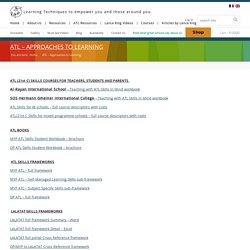
ATL Visual MYP. Develop Research skills. According to Marcus Aurelius- “Research is the ability to investigate systematically and truly all that comes under your observation in life” Research – The word itself signifies Re- Repeat Search – Your finding Research skill is a skill of finding reliable information, organizing it and understanding its applicability in different situation.
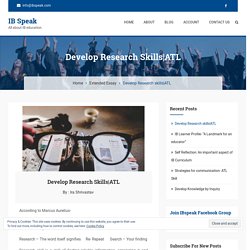
It involves intensive search of information from various sources and its interpretation (media literacy). This information is then evaluated by the researcher and presented in different forms depending on its use in different situation. Media and information literacy as two different but closely associated aspects of research skill. Development of research skill should start with better understanding of media literacy as child first comes across various information through media like you tube, TV, magazines. How Research skills develops the personality?
Research skills enables to learn the technique of evaluating an information by critical thinking. IB Documents. Professional Development - IB. Dear All, There will be a special Early Years workshop event in Singapore from the 17 -19 February.
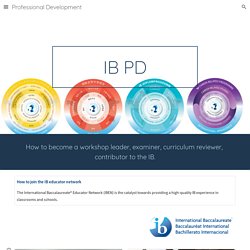
We will be hosting a special plenary event which will be lead by Monita Sen, PYP Manager and Claire Forbes, PYP Associate Manager. See details below. February 17 - 19, Singapore Making the PYP happen in the classroom in the early years, cat 1 Pedagogical leadership in the early years, cat 2 Assessment in the early years, cat 2 Play-based learning, cat 3 The role of arts in the early years, cat 3. MYP: From principles into practice. The MYP extends IB approaches to learning (ATL) skills categories into 10 developmentally appropriate clusters.
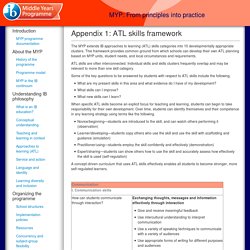
This framework provides common ground from which schools can develop their own ATL planning based on MYP units, student needs, and local circumstances and requirements. ATL skills are often interconnected. Individual skills and skills clusters frequently overlap and may be relevant to more than one skill category. Some of the key questions to be answered by students with respect to ATL skills include the following. IB Matters podcast. Search this site IB Matters A podcast for IB-interested teachers, students, parents, universities, and community members Click on the icons below to access podcast episodes featuring all four IB Programmes and other aspects of the IB framework of international education.
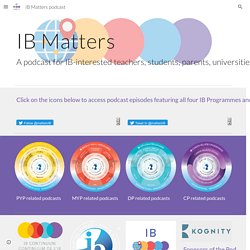
PYP related podcasts. IB Community Blog.